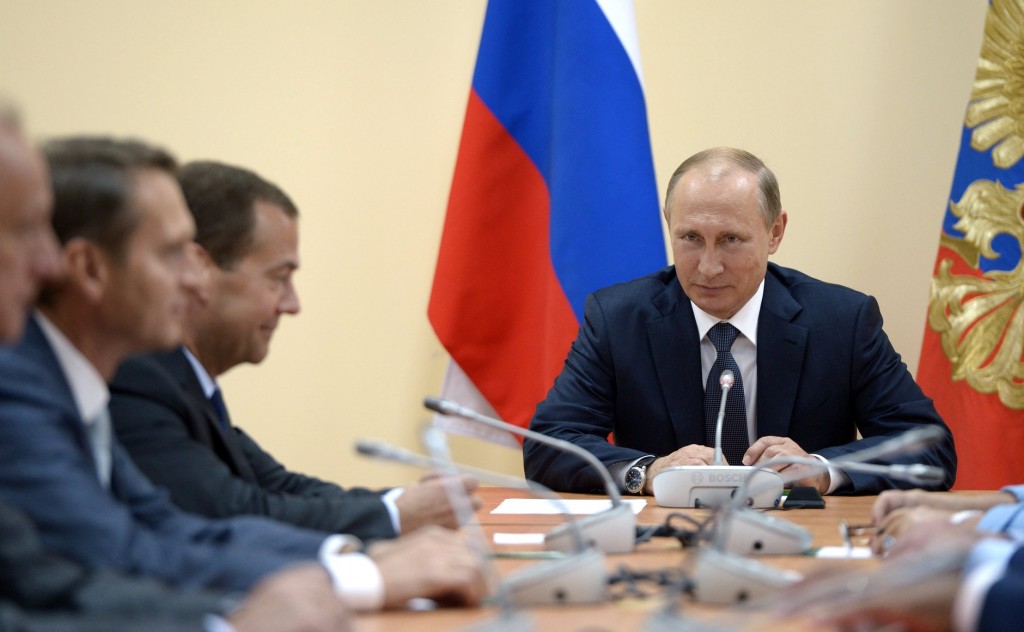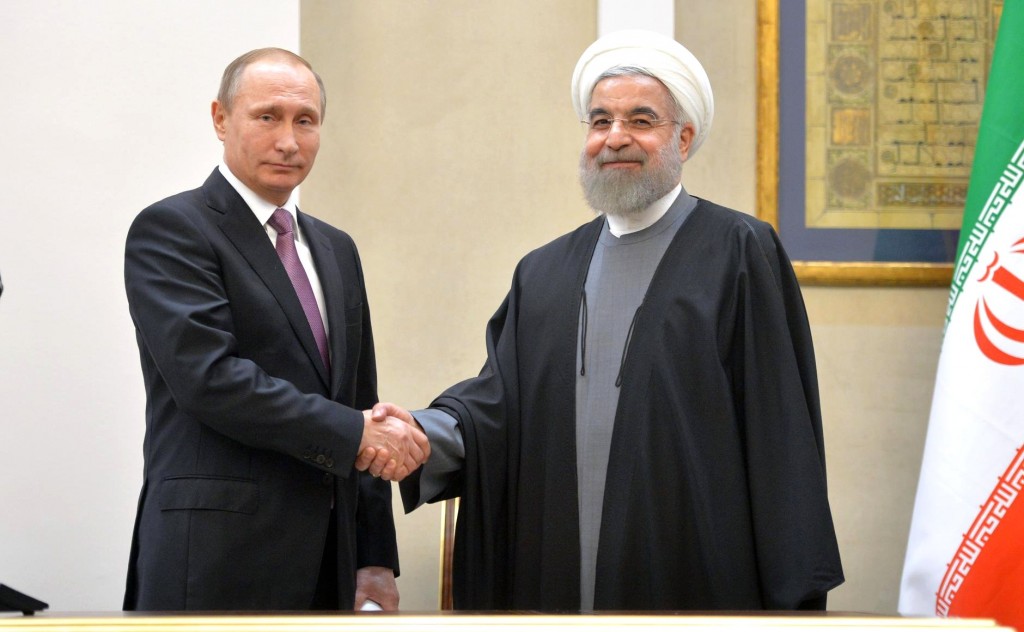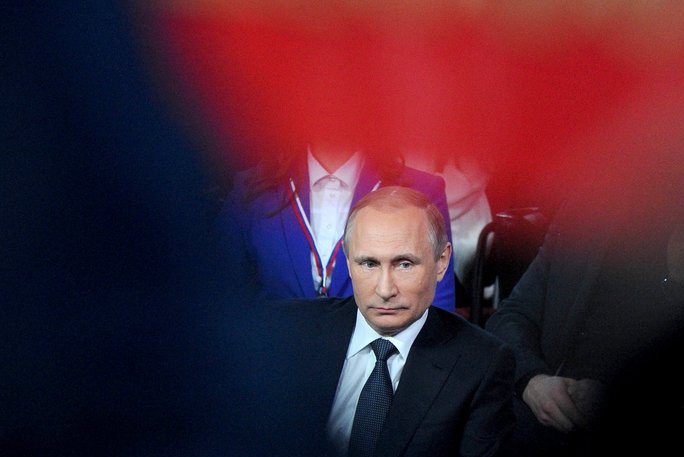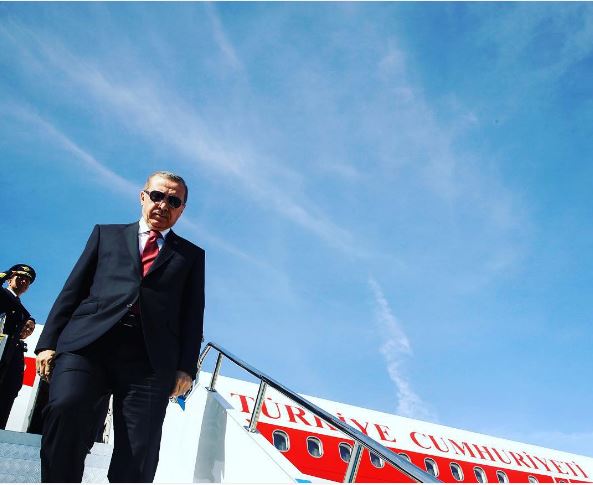An open letter to the next leader of the free world.
Dear President-Elect,
Congratulations on winning the election for the 45th president of the United States, but are you sure you really want this?
The world is a mess, as it usually is, and taking on this awesome responsibility right now is like trying to solve a Rubik’s Cube that a devious trickster messed with by moving some of the stickers around.
You are not battling a Hitler or Hirohito that you can bomb into submission. Nor are you facing down a Stalinist empire that you can outspend into oblivion.
You and the citizens whom you have been elected to serve are beset instead by a constellation of problems—international terrorism, rogue states, and a renascent expansionist Russia. These persistent features of our international landscape may not be as dangerous as the Nazi rampage across Europe or the threat of all-out nuclear confrontation, but they are much more intractable. They will bedevil us throughout your presidency and beyond.
You will not be able to democratize the Middle East and drain the swamp of its political pathologies by using regime change or any other tool at your disposal. Nor will you be able to diplomatically “engage” your way to being liked by the Vladimir Putins and Ali Khameneis of the world. You can flush the terrorists of ISIS out of their nests and vaporize them with Predator drones, but they’ll pop up again in some other unstable and anarchic part of the world.
I hate to break it to you, but these are problems to be managed rather than solved. At least the Israelis, who have become masters of this art throughout the brief existence of Jewish state, can commiserate with your unenviable role.
You’re going to have to come to grips with it, though, because it’s all on you now.
The American president, the Commander-in-Chief of the United States Armed Forces, is practically a foreign policy dictator. You can start wars without going through Congress. (Congress and the public will complain, don’t kid yourself about that, but it will be too late.) You can end wars—or at least choose to stop fighting and let them continue without you. You can order daring raids against the likes of Osama bin Laden if you think you know where they’re hiding, you can forge and unmake alliances, and you can initiate all kinds of black ops that the public is unlikely to discover as long as they don’t catastrophically fail.
You will have more power and authority on foreign policy than you will over any other area, and since what you do with this power can affect the entire human race, you’d damn well better wield it wisely.
So I’m here to give you some advice, and it’s not quite the same as what you’ll hear from Ivy Leaguers from Foggy Bottom and Langley in their jackets and ties. Unlike most of them, I’ve spent more than a decade on and off in the broken parts of the world. I’ve seen radical Islamic terrorism up close and personal, not just in Lower Manhattan, but also in Beirut and Baghdad. I’ve encountered violent Russian expansionism in person in the post-Soviet republic of Georgia. I’ve spent more time than is good for my health in post-war rubblescapes from Bosnia to Fallujah, and I’ve worked illegally as a journalist inside tyrannical police states from Raul Castro’s Cuba to Moammar Qaddafi’s Libya.
My experience spans a Republican administration and a Democratic administration, and though I haven’t seen it all, I’ve seen enough of it, and I’m here to tell you: No party or ideological faction has The Solution because The Solution doesn’t exist. Much of the world beyond our shores is a wreck, and the best you can pull off right now is damage control.
First things first. You need to get real about Russia.
No more “resets” or “bromances.” Vladimir Putin is not your friend.
He is implacably hostile to the U.S. and Europe for one simple reason. He recoils from the expansion of NATO into Eastern Europe, just as we would have done had the Soviet Union won the Cold War and expanded the Warsaw Pact to Brussels and Amsterdam.
So Putin pushes back anywhere and everywhere he can. The handful of countries in his backyard that haven’t yet joined the European Union and NATO but might some day—Georgia, Ukraine, Belarus, Armenia, and Moldova—must either bow to Russian hegemony or suffer the consequences.
Armenia and Belarus kiss Putin’s ring, but Georgia, Ukraine and Moldova do not, so Moldova’s breakaway province of Transnistria is occupied by Russian soldiers, while Georgia’s breakaway provinces of South Ossetia and Abkhazia, along with Ukraine’s Crimean Peninsula, aren’t just occupied by the Russians but annexed.
Disputed territory conflicts prevent all of these countries from joining the European Union or NATO.
You can be excused if you didn’t see Russia’s invasion of Georgia coming back in 2008, but Russia’s invasion and bloody dismemberment of Ukraine should have been a no-brainer. I drove from Poland through Ukraine to Crimea in 2010 and predicted in my book, Where the West Ends, that it wouldn’t be long before Russia annexed the region. I said so matter-of-factly. It didn’t even occur to me that the notion would be controversial because it was obvious.
Ukraine’s disaffection with Russia dates back at least to the genocidal hunger-famine of the 1930s, when Josef Stalin deliberately starved millions of Ukrainians to death in the name of collectivization. In our post-Soviet era, it was inevitable that Ukraine would receive the Moldovan and Georgian treatment and lose Crimea—the best piece of real estate in the country, where almost everybody speaks Russian instead of Ukrainian, and where the Russian navy bases its Black Sea fleet.
Yet somehow—astonishingly—the CIA and the State Department did not see the Crimea invasion coming.

Russian President Vladimir Putin chairs a meeting of the country’s security council in Sevastopol, Crimea, August 2015. Photo: kremlin.ru
I’m hardly the only person who did see it. I was in the Georgian capital Tbilisi when Russian soldiers invaded and lopped off parts of that country, and the fact that Ukraine was most likely “next” was the talk of the town among Georgians, journalists, and stressed-out resident diplomats.
Surely you remember George Kennan, our ambassador to the Soviet Union under Harry S. Truman and the architect of our Cold War policy of “containment”? “Russia,” he famously said, “can have at its borders only enemies or vassals.” Any and all of Russia’s borderland countries (the name Ukraine, by the way, means “borderland”) that aren’t under the NATO umbrella and refuse to obey like a good vassal will be invaded and butchered. The was true before the Cold War, it was true during the Cold War, and it’s still true today. It has been true for centuries. Just ask the residents of Siberia and Northeast Asia like the Buryats and the Koryaks who have been conquered so thoroughly that most people don’t even know they exist.
Would it be great if we could get along with Russia or reset relations? Of course. But it’s not going to happen because there’s not a damn thing you can to do change Russia’s national interests or its centuries-long hostility toward its neighbors. You want to know what Putin hears when you outstretch your hand and say we should be partners? He hears what Luke Skywalker heard in The Empire Strikes Back when Darth Vader said, “Join me and together we can rule the galaxy as father and son.”
Your predecessor Barack Obama said to New Yorker editor David Remnick in 2014 that he didn’t need George Kennan. But he did! He also needed a handful of advisers who’d spent at least some time in post-Soviet space while bullets whizzed past their ears.
Are you familiar with the phrase “echelons above reality?” It’s U.S. militaryspeak for the upper-level headquarters that are so far above the ground that the people who work there have no idea what’s actually happening. It’s where you and most of your advisors live. So please, I implore you, invite at least a couple of people into the Oval Office who have some mud on their boots.
So it’s time to get real about Russia, and that includes Russia’s role in Syria and the Middle East more widely. Contrary to popular belief—though you should already know this if you’re listening to your intelligence briefs—Russia is not fighting ISIS in Syria. Russia is in Syria for one reason and one reason only: to prop up Bashar al-Assad’s Arab Socialist Ba’ath Party regime. Assad is not and never has been a “reformer.” He is and always has been a brutal tyrant and the biggest state sponsor of international terrorism in the Arab world. He even sponsored al-Qaeda, not just during the Iraq War, but also during the Syrian war.
Assad is backed by the Iranian regime and the Shi’a Islamists of Hezbollah as well as the Russians. There will be no dislodging him any time soon. And since neither he nor the Iranians nor the Russians are interested in fighting ISIS right now—despite their public statements to the contrary—we’re going to have to do it ourselves with help on the ground from indigenous forces.
The only indigenous forces willing and able to take on ISIS and win are the Kurds.
Some Arab rebels are actually ISIS supporters while most of the others are prioritizing the fight against Assad.
The Kurds are great, though.
I went to Iraq seven times during the war and spent roughly half my time with them in the north. Kurdistan is no glittering Dubai. It is, however, remarkably stable and sane, especially compared with the post-apocalyptic hellscapes of Arab Iraqi cities like Fallujah and Ramadi.
Having a conversation with most Kurds about anything—local politics, geopolitics, culture, religion, you name it—is like having the same conversation with even-keeled Americans from places like Texas and Iowa. They are, almost to a person, religiously moderate, politically centrist, and allergic to the kinds of paranoid conspiracy theories so tragically common in the Arab world (and, increasingly, in the United States). They’re more pro-American than even Americans, and they’re the best fighters in the region by far after the Israelis. They routed Saddam Hussein’s army after the first Persian Gulf War, they’ve lopped off chunks of ISIS-controlled territory in Syria, and they’re currently dishing it out to ISIS in Mosul.
These people do not want to be shackled to Baghdad, and they do not want to be shackled to Damascus. They’ve wanted their own state for more than 100 years now, and they were promised one, too, after the collapse of the Ottoman Empire.
Under what theory do the Palestinians deserve their own state while the Kurds don’t? The Kurds are our best friends in the Muslim Middle East. They stand with us on every question that matters. They were against Saddam Hussein, none of them fired a shot at us during the entire Iraq War, they are against all forms of Islamic religious totalitarianism from Hamas and Hezbollah to Al Qaeda and ISIS, and they’ve done nearly all the ground fighting against ISIS in Syria.

Peshmerga near Mosul remove the Islamic State flag and replace it with the Kurdish flag. Photo: Kurdish Struggle / flickr
The United States should not be in the business of redrawing borders in the Middle East. Middle Easterners need to do that themselves. We shouldn’t get in their way, though. It’s time to back the Kurds to the hilt and give them the green light to declare independence, partly because it’s the right thing to do, partly because we need their help and partly because it’s the smart move strategically. Free Kurdish states in Syria and Iraq will permanently deny territory to the likes of both Assad and ISIS.
Actually, Iraq should probably split into three states—Kurdish, Sunni, and Shia. ISIS would have gotten nowhere in Iraq if Iraq were three separate countries. The Sunnis in ISIS territory wouldn’t have felt like they had to make a deal with the devil to protect them from what they see as the greater Shia devil in Baghdad.
Iraq has never been a coherent nation-state; arguably, it wouldn’t exist if the British Empire hadn’t installed the Kingdom of Iraq in 1932. Its three biggest communities—Sunni Arabs, Shi’a Arabs and Kurds¬—have proven themselves incapable of living together in peace. The country will probably never be both democratic and stable within its current borders. Splitting Iraq into its three constituent parts would be better for the people who live there. It would be better for us, too, insofar as this separation would prevent the kind of unstable anarchy that breeds both Sunni and Shia militias, including ISIS.
But here we run into another problem. One of Iraq’s neighbors would viscerally object to this outcome. Namely, Turkey, a NATO member and traditional ally that becomes less reliable with each passing year. So you, as our next President, cannot afford to indulge Turkey in the way that your predecessor has.
Turkey hates the very idea of an independent Kurdistan for one simple reason—roughly 20 percent of its own population is Kurdish. A free and independent Iraqi Kurdistan may inspire and assist Turkey’s own Kurds to carve out a Kurdish state of their own in the east of the country where most of them live.
Because Turkey has been part of the Western alliance, and has been a more-or-less stable semi-democracy ever since Mustafa Kamal Atatürk founded the modern republic, we’ve been holding off on championing Kurdish independence, but the dynamics of this relationship have changed significantly over time.
Turkey is now so hostile to Kurdish aspirations even outside Turkish borders that its increasingly deranged president, Recep Tayyip Erdogan, has implicitly taken the side of ISIS in the Syrian war. It’s not that he swoons over ISIS. Erdogan just thinks that, compared with the Kurds, ISIS is the lesser of evils. So while he’s not actively supporting ISIS, he has been fighting the Kurds and giving ISIS a pass.
Obama made a terrible mistake when he named Erdogan as one of the world’s best leaders. He even told Fareed Zakaria at Time magazine that Erdogan was among the five leaders in the world with whom he’d established “friendships and bonds of trust” and “close working relationships.”
A lot of us who’d been living and working in the Middle East for the past decade or so frankly found this appalling, and that was before Erdogan took the wrong side in the war against ISIS. For years, Turkey has thrown more journalists into prison than any other country on Earth. That all by itself should tell you everything you need to know about Erdogan, but if the picture wasn’t clear before, it had better be now. The failed coup attempt by Turkish army officers in July of this year unleashed Erdogan’s inner Hugo Chavez.
Within a matter of weeks, he fired 9,000 police officers and 21,000 private school teachers. He arrested more than 10,000 soldiers and suspended almost 3,000 judges. He fired more than 21,000 officials from the Ministry of Education and forced 1,500 university deans to resign. He closed more than 100 media outlets and suspended more than 1,500 Ministry of Finance officials.
He doesn’t share our values domestically, and he is not on our side geopolitically. If Turkey wasn’t already in NATO, it would not be invited to join.
Indeed, a lot of Americans want to kick Turkey out of NATO. Don’t. It might be emotionally satisfying, but we’re going to have to deal with the Turks whether we and they like it or not, and we’ll get far better results if we do it within a cooperative framework than if we don’t.
It is, however, long past time for Turkey to feel a cold wind blowing from Washington. Erdogan isn’t our enemy, but he’s hip deep in frenemy territory, which is why we have to level with him. The positions he’s taking clash with our interests. If Erdogan continues to alienate the United States, he will end up more dependent on Putin and the Russians—and he distrusts and fears both. Doing what we ask him to do is therefore in his best interests.
Which brings me to another observation about our regional allies. You know who isn’t in frenemy territory? The Prime Minister of Israel, Benjamin Netanyahu. Only in an upside-down world does it make any kind of sense to pal around with Erdogan and slam Netanyahu, as Obama has done.
“When there is no daylight [between the U.S. and Israel],” Obama said in 2009, “Israel just sits on the sidelines, and that erodes our credibility with the Arab states.”
Well, Obama did manage to put some “daylight” between the U.S. and Israel throughout his presidency by picking one public fight with the Israelis after another, but aside from ramping up Israeli angst, it accomplished a grand total of nothing.
We could spend all day, all week, all year or even your entire presidency litigating every detail of the Israeli-Palestinian conflict, or we could skip all that and boil it down to its essence: Both the Israelis and Palestinians want all the land between the Jordan River and the Mediterranean, but they’re going to have to share it. The majority of Israelis resigned themselves to this fact decades ago and have repeatedly elected prime ministers who are willing to sign on to a two-state solution, but the Palestinians haven’t. When a clear majority of Palestinians catch up to the Israelis, the conflict will end. Until then, the conflict will grind on.
You can spend four or eight years trying to force the Israelis to give up more than they already have, but it won’t do an iota of good if the Palestinian side remains rejectionist. It won’t earn you many points with the Arab world, either, and the only way you’ll earn points with the likes of Hamas is by ordering air strikes on Tel Aviv.
There can be no peace between Israelis and Palestinians while Hamas still rules Gaza anyway, and one of the reasons Hamas still rules Gaza is because it’s still receiving money and guns from Iran, just as the Assad regime and Hezbollah do.
The Iranian government’s ultimate goal is to become the regional hegemon of the greater Middle East. That emerging reality didn’t disturb Obama, but it should keep you up at night.
Last year, Ali Youseni, an advisor to Iranian President Hassan Rouhani, made what that implies perfectly clear. “Iran, he said, “was born an empire.”
Iran has been a regional power since the Persian Empire ruled a huge swath of the ancient world. Robert D. Kaplan explained it this way in Foreign Affairs in 2009:
It is not an accident that Iran was the ancient world’s first superpower. There was a certain geographic logic to it. Iran is the greater Middle East’s universal joint, tightly fused to all of the outer cores. Its border roughly traces and conforms to the natural contours of the landscape—plateaus to the west, mountains and seas to the north and south, and desert expanse in the east toward Afghanistan. For this reason, Iran has a far more venerable record as a nation-state and urbane civilization than most places in the Arab world and all the places in the Fertile Crescent. Unlike the geographically illogical countries of that adjacent region, there is nothing artificial about Iran. Not surprisingly, Iran is now being wooed by both India and China, whose navies will come to dominate the Eurasian sea lanes in the 21st century.
Of all the shatter zones in the greater Middle East, the Iranian core is unique: The instability Iran will cause will not come from its implosion, but from a strong, internally coherent Iranian nation that explodes outward from a natural geographic platform to shatter the region around it.
This would be excellent news if Iran were a properly functioning liberal democracy that more or less shared our values. It might even be okay if it were more like Turkey—an illiberal semi-democracy with a great deal of tension between its religious and secular halves. Iran, though, is none of those things. It is a brutally repressive sectarian theocracy that uses militias and international terrorist organizations to advance its ambitions.
Iran is actually the biggest state sponsor of international terrorism in the world, and it has been our chief adversary in the Middle East since followers of Ayatollah Khomeini took 52 American diplomats hostage at our embassy in Tehran following the 1979 revolution.
Five countries in the Middle East and North Africa are currently imploding into fragments controlled by militias: Iraq, Syria, Libya, Lebanon, and Yemen. Iran supports armed groups in four out of five of those countries—Hezbollah in Lebanon and Syria, Shi’a militias in Iraq, and the Houthi rebels in Yemen— in addition to backing Hamas in Gaza.
Remarkably, Iran’s ruling mullahs have expanded their reach without nuclear weapons, and while suffering crippling sanctions related primarily to their clandestine nuclear program. Now that its economy and government are no longer held back by many of those sanctions, which were lifted in the wake of the nuclear deal in 2015 that President Obama presented as an enhancement of our national security, Tehran will have billions more dollars to spend on its various terrorist projects. It can also pour money into the Iranian economy and buy itself more legitimacy and a longer life span.
Obama and his defenders have argued, with some justification, that slowing down Iran’s nuclear weapons program without using force is a whole lot better than an imminent Iranian bomb or another all-out war in the Middle East.
But the key consideration here is that Iran’s nuclear weapons program is simply a means to an end, which is Middle East dominance.

Russian President Vladimir Putin and Iranian President Hassan Rouhani meet in Tehran, November 23, 2015. Photo: kremlin.ru
It’s too late to back out of the nuclear deal, but it’s not too late to reimpose sanctions. And it’s not too late to refuse paying ransoms—surely you know that the regime just kidnapped two more American hostages because it thinks it can get away with it.
You should start twisting the screws again posthaste, and you should make it clear that you’re going to do so before you’re even inaugurated. The sooner you adopt these measures, the sooner the Iranians will realize that you are not like your predecessor and shouldn’t be messed with.
In essence: Get real about Russia, finish off ISIS in Syria, back the Kurds to the hilt, downgrade relations with Turkey, repair our relations with Israel and crack down hard again on Iran. World peace won’t break out if you do these things, but we’ll be a lot better off than if you don’t.
All this advice is based on one simple principle—you reward your friends and punish your enemies. It’s the first rule of foreign policy, one that has been with us since antiquity and will survive until the end of time. Presidents who behave as though this rule doesn’t apply to them are as doomed to fail in foreign policy as rocket scientists who ignore gravity. Hubristically declaring that it would not do “stupid shit” like its predecessors, the Obama administration flipped this rule on its head over and over again—with Israel, with Russia, with Iran, and with Turkey—with disastrous results every time.
So turn things around. Again: Reward your friends and punish your enemies. Tattoo that rule on the back of your eyelids if you have to.
![]()
Banner Photo: Adam Schultz / flickr







